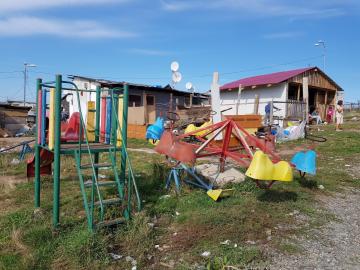Many EU Roma face life like people in the world’s poorer countries

“Anti-Gypsyism, from discrimination to hate crime, fuels the vicious cycle of Roma exclusion. It leaves them as societal outcasts and treated in a stereotypical manner that is intolerable,” says FRA Director Michael O’Flaherty. “We need to break this vicious cycle. So why not start with the obvious – ensuring that each and every Roma enjoys the same opportunities as other EU citizens?”
The ‘A persisting concern: anti-Gypsyism as a barrier to Roma inclusion’ report reveals how Member States are still falling short on most of their integration targets, despite efforts so far. This is a key element of the EU’s 2011 National Roma Integration Strategies Framework. Areas of particular concern include:
- Anti- Gypsyism remains high with one out of three Roma being victims of harassment. Member States need to recognise and monitor anti- Gypsyism, and take effective measures to combat such hate crime and hate speech.
- Living conditions for EU Roma have not changed much between 2011 and 2016: 80% of Roma are at risk of poverty compared with an EU average of 17%. 30% live in households with no tap water. Their access to safe water is often on a par with people in Ghana or Nepal. Such conditions undermine progress in education, health or employment. This calls for greater efforts on reducing poverty including eliminating segregated housing, better access to public utilities like electricity and water as well as more social housing.
- Education has improved in some Member States but gaps remain. Over 50% of young Roma children attend early childhood education. This is often much less than non-Roma children their age. As for pre-school education rates, Roma in the EU are similar to the people of Puerto Rico. Member States should provide access to high quality education, learning support to compensate for the poor living conditions of many Roma pupils, as well as targeted support at every stage of their education.
- Youth unemployment: The share of young Roma from 16-24, particularly women who are not in employment, education or training remains high compared to the general public. Member States need to boost employment, particularly for young Roma, through on-the-job training, traineeships and apprenticeships, for example. Roma should also receive targeted support to help them set up their own business.
This report will feed the debate on future EU Roma inclusion as the existing EU framework ends in 2020. It measures the impact of existing measures over the years. It also contextualises Roma deprivation against other countries globally. This will help the EU and its Member States measure their commitment to the UN’s Sustainable Development Goals.
The report was issued pursuant to the European Parliament Resolution of 25 October 2017 on fundamental rights aspects in Roma integration in the EU: fighting anti-Gypsyism (2017/2038(INI)). Following this resolution, the European Parliament requested the Agency to issue “an independent report formulating opinions on progress made on Roma inclusion since the Commission’s Communication of April 2011 and focusing on the impact of anti-Gypsyism and measure taken to address it”.
For more information please contact: media@fra.europa.eu / Tel.: +43 1 580 30 642